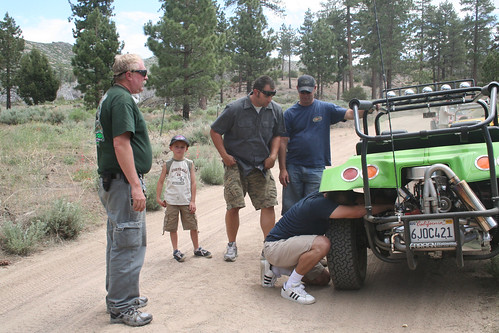
It's not only important to have the data you need to diagnose and solve a problem, you must also be able to evaluate and apply that data with regard to its relevance and its magnitude of importance in achieving the desired end result. Yeah, right.
Okay, so you've got a mechanical malfunction of some sort, say your engine sometimes won't idle. How do you fix that? The first thing you need to do is gather data. Why doesn't it always idle correctly? What is the variable that causes the problem to only occur "sometimes?" What systems are involved in regulating the idle speed? What moving parts are involved? Once you have gathered your data, you can then proceed to identify and fix the problem . . . or, you can do it the way I do.
What I usually do is to simply cope with the problem for as long as possible until it becomes so annoying, or the car becomes so completely undriveable, that I am forced to do something about it. For most problems, this method works quite well. It forces me to think about the problem every time I drive the car, since I am constantly working around it, or having to overcome it in some way just to operate the vehicle. Take the idle problem I mentioned above. Sure I could have spent a morning figuring out why the car wouldn't hold its idle speed, and then fixed it so that it would. Instead, I've been driving around for a couple of years mostly ignoring the problem, or at most, cursing the carburetor for its inability to function properly. I reached my annoyance threshold the other day and was finally forced to figure it out.
Turned out it was a pretty simple fix. I had suspected for some time that the problem had something to do with the automatic choke. This made sense to me because the choke and its linkage is designed to kick the idle up when the engine is cold and then let the idle drop back down once it gets warmed up. On my old Ford truck, the automatic choke used the heat from the coolant inside a heater hose to regulate how much choke to apply and when to open itself back up. On my VW carburetor, there is an electric coil that starts heating up as soon as you turn the ignition key to the "on" position. Once that coil reaches a certain temperature it causes the choke to open and allows the idle to return to a nice, moderate speed, unless, of course, it's not working properly, or is not adjusted correctly.
I had an errand I was running over on the west side of Hollywood when I finally decided to solve the problem. I always carry a multi-tool on my belt, just in case I might need to perform some sort of MacGyver style repair whilst on the road. Every time I stopped and parked, I would attempt to adjust the carburetor to get the consistent idle speed which I was seeking. Eventually, after a number of stops, I got the choke adjustment right and the idle speed dialed in so that it works pretty much like it should at this point.
It's not as if I don't know how to diagnose a problem, or how to repair it once I know what is causing it. It's just that sometimes the problem is so minor, that I put off fixing it until I just can't put up with it anymore. I suppose that if I was in a situation where I was not the only driver of this car, I would be more motivated to fix the minor rattles and squeaks and such that crop up from time to time, but since it's just me, I tend to let them go for as long as possible. Major stuff, safety stuff, I always fix right away, but minor tweaks always seem to get put down at the bottom of my to-do list, right down there with gauges and interior amenities. Someday I'm going to install a working fuel gauge. Someday. But after not having one for the last ten years or so, it's just not much of a priority.




No comments:
Post a Comment